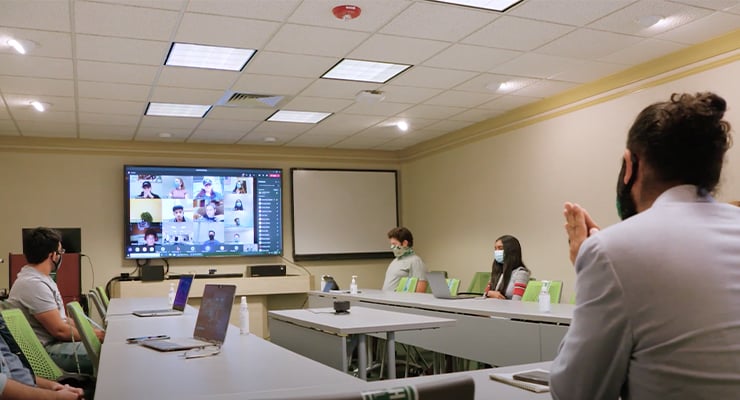
An Inside Higher Ed story posted on Nov. 4, 2019, reports bad news from ACT results for the high school Class of 2019. It cites a continuing decline in college readiness, with results on English and math at a 15-year low. Data show that 37 percent of students hit three of four ACT college readiness benchmarks – 36 percent didn’t hit any. Since 52 percent of the Class of 2019 took the ACT, a lot of red flags are flapping in the breeze. Should you be flying one? Depends on how you answer the core question of our quiz: Are you ready for college?

Gauging College Readiness
The Inside Higher Ed story says 73 percent of the Class of 2019 graduates who took the ACT “plan on pursuing postsecondary education at some level.” That’s about 1.3 million students. The ones who fell short on the ACT college readiness benchmarks have some work to do, as do those who came up short on the SAT college readiness benchmarks.
So, what do SAT and ACT readiness benchmarks mean?
- ACT says: “The ACT College Readiness Benchmarks are the minimum ACT scores required for students to have a high probability of success in credit-bearing first-year college courses. Students who meet a benchmark on the ACT have approximately a 50% chance of earning a B or better and approximately a 75% chance of earning a C or better in the corresponding college course or courses.”
-
SAT says: “Students with an SAT Math section score that meets or exceeds the benchmark have a 75 percent chance of earning at least a C in first-semester, credit-bearing college courses in algebra, statistics, pre-calculus, or calculus. Students with an SAT Evidence-Based Reading and Writing (ERW) section score that meets or exceeds the benchmark have a 75 percent chance of earning at least a C in first-semester, credit-bearing college courses in history, literature, social sciences, or writing classes.”
Those benchmarks aren’t the only empirical metrics of college readiness. ACCUPLACER is another example of a tool used to gauge college readiness and guide college course placement.
And formal testing isn’t the only way to assess readiness. There’s also self-awareness. You know whether you have academic weak spots/Achilles’ heels. If you aren’t sure, it’s time for a reality check.
Set to Go’s website addresses the college readiness issue under these categories: finances, academics, emotions, and life goals.
Those are great areas to focus on when it comes to assessing whether you are ready for college. We can help you sharpen that focus with a series of questions and a downloadable quiz.

Financial Factors of College Readiness
At this stage, you should know your benchmark numbers and how they add up. When it comes to self-assessment, at the very least you should know the answers to these questions:
- Is there a college savings account that you and/or your parents have been feeding?
- Have you exhausted all options in the search for scholarships?
- Did you secure the best possible financial aid package?
- Did you know you can appeal the financial aid package your school has awarded you?
- If you plan to work while going to school, have you explored employment options available at the school and in the surrounding communities?
- Have you been working on budgeting skills, with a plan that includes unexpected college expenses and employs tactics of a strategy to avoid college debt?
Academic Factors of College Readiness
Beyond benchmark scores, your high school experiences/transcript can inform what you need to do to prepare for college-level academics. Maybe revisiting all that has you tackling a summer reading list, or maybe you’re doing some do-it-yourself remedial work after having grilled professors, students, and alumni of your college to see just how much academic game you’re going to have to have.
If you haven’t quite figured out what part of your game needs work, ask yourself these questions:
- Have you prepared yourself for a scenario wherein you’ll be studying in virtual classrooms?
- Time management and organizational skills are a critical part of managing the college academic workload. How are yours?
- Do you need to strengthen your study habits and techniques?
- Have you researched your college’s academic support system, from study centers and tutoring to libraries and in-dorm amenities and assistance?
- Are you disciplined enough to do the required work within the allowed time?
Emotional Factors of College Readiness
Academic excellence is a goal you’re unlikely to achieve if you let your physical and mental health deteriorate, jeopardizing your emotional wellbeing. So, get the skinny on the value of sleep and avoiding infectious diseases, and know that answering yes on these questions is an investment in academic and thereby career success.
- Do you know how to handle common household chores and duties? Laundry? Cooking? Shopping? Balancing your bank account?
- Have you researched campus and community resources, from medical services to stores?
- Have you researched available transportation and how to find locations you will need to frequent?
- Do you know how to stay safe on campus and where the risks are highest on and off campus?
- Have you considered the inevitability of homesickness and stress (academic and otherwise) and ways to cope with both?
- Have you packed for college based on the climate/geography you’re going to be experiencing rather than what you’re leaving?
- Have you researched housing and connected with your expected roommate(s) to lessen the shock of living with someone whose habits are unknown?

Life Goal Factors of College Readiness
If you know what you want to be when you grow up, you’ll be a lap or two ahead of most freshmen in the race for a major and career. It’s a study in who you are. Is your focus money? Service? Reputation? Fame? Celebrity? Discovery? Creative expression?
Life goal decisions are about knowing yourself, and that’s a rare bit of knowledge among college freshmen. Another truth is that not knowing your life goals won’t inhibit your college experience, unless you remain ignorant come the end of your junior year.
If you answer this one question before you become a fixture on campus, you will have found guidance on selecting a major that leads to a rewarding and fulfilling career.
- What’s your passion?
If you expect to find your passion at USF or already know what it is and are planning to exercise it as a Bull, the Office of Admissions is ready to assist. Check us out online, including contact information, or call us at 813-974-3350. We’re ready to engage.


